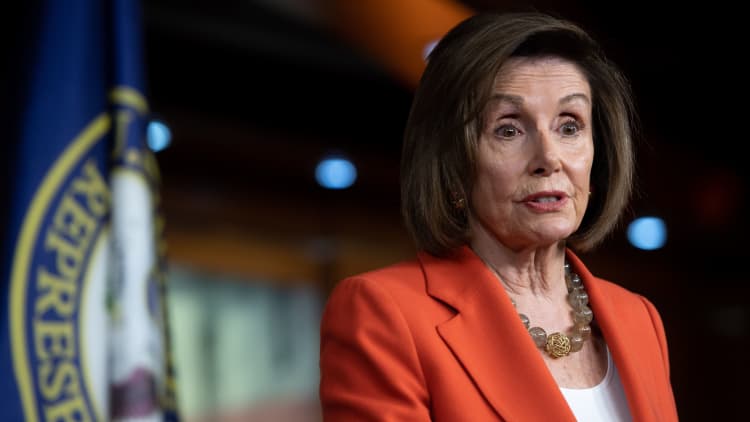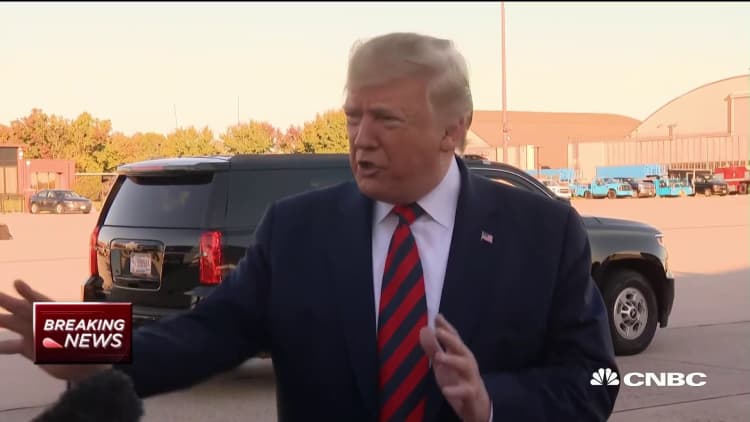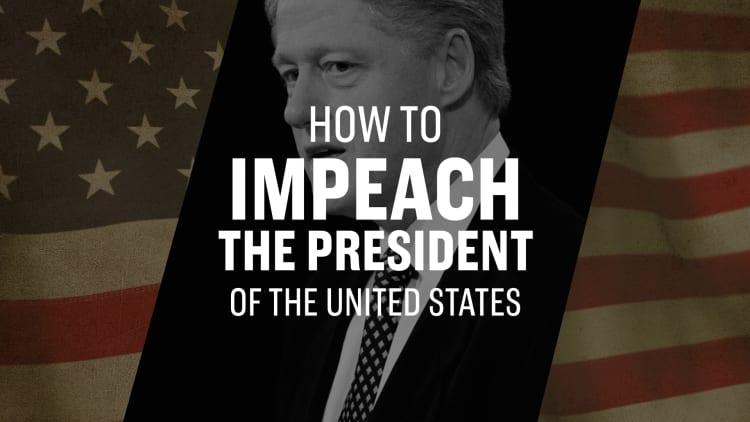
House Democrats on Thursday passed a resolution outlining the next phase of the impeachment inquiry into President Donald Trump.
The 232-196 vote passed nearly along party lines, with no Republicans voting for the resolution. Two Democrats — Reps. Collin Peterson of Minnesota and Jeff Van Drew of New Jersey — joined Republicans in voting against it.
The lone independent congressman, Rep. Justin Amash of Michigan, voted for the impeachment inquiry resolution. Amash left the Republican Party and the conservative Freedom Caucus earlier this year, and has argued since the release of former special counsel Robert Mueller's Russia report that Trump has "engaged in impeachable conduct."
The measure, which sketches out guidelines for public hearings in the inquiry and the president's participation in the process, marks the first time lawmakers' votes will be counted on matters related to the Trump impeachment process.
In a blistering statement, the White House said that the vote by House Speaker Nancy Pelosi and her Democratic caucus does "nothing more than enshrine unacceptable violations of due process into House rules."
The White House and Republicans have attacked the behind-closed-door impeachment proceedings since Pelosi first announced the inquiry last month. Many Republicans had previously called on Democrats to hold a vote to formalize the inquiry — but GOP leaders nonetheless attacked the resolution when it was introduced this week.
The White House's statement claims that Democrats have "conducted secret, behind-closed-door meetings, blocked the Administration from participating, and have now voted to authorize a second round of hearings that still fails to provide any due process whatsoever to the Administration."
"The Democrats want to render a verdict without giving the Administration a chance to mount a defense," the White House claims. It also lambasts Democrats for not failing to act on substantive legislative issues, such as "reducing gun violence" — though Democrats have urged Trump and the GOP-held Senate to support a bill on gun background checks that was passed in the House earlier this year.
Trump blasted the impeachment inquiry in a tweet just after the resolution passed: "The Greatest Witch Hunt In American History!"
The vote followed a morning of debate on the floor of the House, where Democrats attacked Trump's alleged abuses of power and Republicans lambasted the way the impeachment inquiry was being conducted.
"We are not here in some partisan exercise. We are here because the facts compel us to be here," said Rules Committee Chairman James Mcgovern, D-Mass., who introduced the resolution earlier this week.
"I don't know why the Republicans are afraid of the truth," Pelosi said. "What are we fighting for? Defending our democracy for the people."

In a Fox News interview, Rep. Mark Meadows, R-N.C., said, "We're not getting our way today, because it's not a fair process."
Meadows criticized the text of the resolution for allowing House Intelligence Chairman Adam Schiff, D-Calif., to "once again to control everything that's going on."
The impeachment proceedings so far center around Trump's request for Ukraine President Volodymyr Zelensky to investigate former Vice President Joe Biden and his son Hunter, as well as alleged Ukraine involvement in the 2016 presidential election.
A whistleblower raised alarms about those requests, made by Trump in a July 25 call with Zelensky while hundreds of millions of dollars in military aid to Ukraine were withheld without a clear explanation at the time from the White House. That aid was eventually delivered in September.
Trump has denied that his interactions with Ukraine amounted to anything like a quid pro quo.
But the inquiry's witnesses testified before House committees that both the Ukraine aid and an invitation for Zelensky to visit the White House were suspected of being dangled in exchange for Ukraine announcing probes into the Bidens and the 2016 election.
Top Ukraine diplomat Bill Taylor, for instance, testified that U.S. Ambassador to the EU Gordon Sondland told him "'everything' was dependent on such an announcement, including security assistance."



